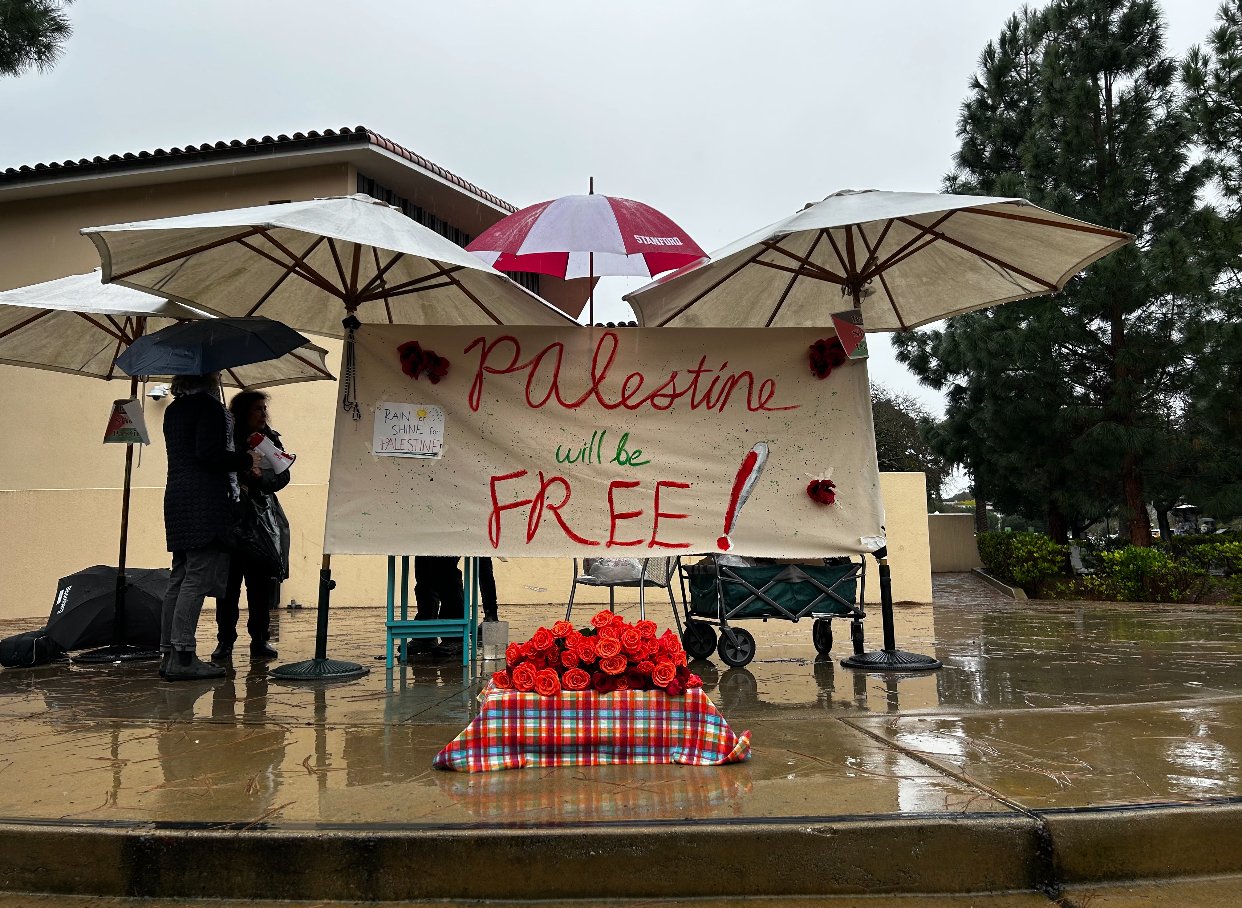Students advocating for Palestine amid the ongoing Israel-Gaza war have made progress through public displays of protest, including the longest student-run sit-in in Stanford history. While the sit-in’s physical space was removed last week, they negotiated with the University and achieved some demands, including increased support for Palestinian, Arab and Muslim students.
But they aren’t the only members of the campus community engaged in a public call to action. Stanford Faculty for Justice in Palestine (FJP), composed of faculty, staff and lecturers from across the University is also entering the conversation.
FJP was founded with a primary purpose to “stand in solidarity with … students exercising their right to free speech” and secondarily, to “create a fact-based and more inclusive education for all members of the Stanford community with regard to the suppressed, and often distorted, history of the Palestinian people.”
They sent a letter to administrators on Feb. 11, where they criticized the University’s threats to shut down the Sit-In to Stop Genocide’s overnight demonstration. FJP urged the administration to facilitate good-faith negotiations between University leadership and sit-in representatives, and abstain from disciplinary action toward participants.
The University eventually reached an agreement with sit-in representatives on Feb. 12 to extend a reprieve period until Feb. 16, during which time the University “agreed to refrain from initiating law enforcement action and Office of Community Standards proceedings.”
According to their official website, Stanford’s FJP includes “tenure and non-tenure track faculty, staff, and lecturers.” FJP founding member and associate professor of religious studies Anna Bigelow said members came from all fields, ranging from the School of Humanities and Sciences to the School of Medicine.
Though Stanford’s FJP chapter was only officially established in November, its roots can be traced back six years. As part of and in conjunction with a group called the United States Campaign for the Academic and Cultural Boycott of Israel, FJP founding member and comparative literature professor David Palumbo-Liu came up with the idea of creating FJP chapters, after noticing the proliferation of Students for Justice in Palestine (SJP) chapters across the country.
As of today, there are dozens of Stanford FJP members, though some prefer to remain unnamed. Stanford’s FJP is part of the larger FJP network on college campuses nationwide, including at Harvard, Princeton and the University of California, Berkeley.
Stanford FJP hosted their first public event to honor scholars, educators and artists from Gaza who were killed in the Israel-Gaza war. Despite rain, the noon event drew approximately 60 students and faculty members to the White Plaza outdoor stage.
The event was meant to encourage faculty, students and community members to “really examine the relationship between the United States and this violence that’s taking place in Palestine,” said FJP member and Graduate School of Education associate professor Johnathan Rosa.
Bigelow said that FJP especially wanted to “call attention” to the “devastation of educational resources in Gaza,” specifically referencing the destruction of universities and heritage sites, and the suspension of all school activities due to bombardment.
“It was a difficult situation beforehand, but now, there’s literally no infrastructure,” Bigelow said. “And we’ve lost so many — dozens and hundreds of people who were raising the next generation of people in hope for a world in which they could thrive and they could succeed just like every student at Stanford wants to do.”
The proceedings culminated in an in-memoriam service, where FJP members read the names and biographies of 22 academics and artists who have died in Gaza due to the conflict. Before the event began, crowd members were handed posters depicting the photos and biographies of said individuals. As each name was announced, the crowd member carrying that specific person’s poster walked up to stand on stage.
According to Bigelow, the demonstration was meant to identify and humanize those who have died in the conflict. She said the visual of a human holding the image of someone who has died was hopefully an effective way of symbolizing the totality of the lives lost.
“These are our colleagues, our students. It’s our mission,” said FJP member and associate anthropology professor Sharika Thiranagama. “The world is a poorer place without them.”
Bigelow echoed the calls to action in her closing statement, advocating for “life, dignity and liberation.”
“May we continue to move with our students and with the millions who organize, boycott, divest, refuse and shout for an end to this genocide … May we leave today’s gathering knowing we are not alone. May we continue to move with love and action,” Bigelow said.
The Feb. 7 event is the first of many, Palumbo-Liu said. Another event on Feb. 16 featured a reading of Maya Wind’s book, “Towers of Ivory and Steel: How Israeli Universities Deny Palestinian Freedom.” For their third event on March 1, Stanford FJP has invited Gazan poet Yahya Ashour to give a reading of his works.
Palumbo-Liu said his goal is for FJP to become a regular part of Stanford’s daily life, collaborating alongside Stanford departments to provide educational programming about Palestine that otherwise would not be offered.
“If we take education seriously here in California, here throughout the U.S., we have to take it seriously throughout the world,” Rosa said. “We have to name what’s happening and protect one another.”
